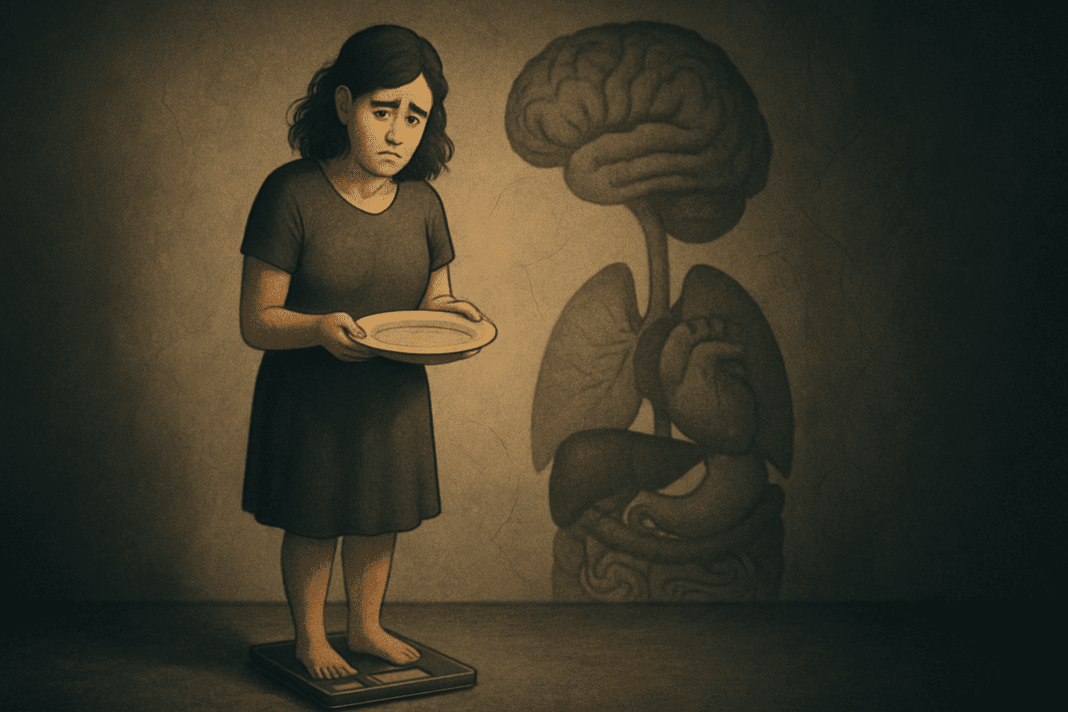It can feel deeply frustrating—and even alarming—to step on the scale and see the numbers rise when your calorie intake is at its lowest. Many individuals ask, “Why am I gaining weight when I barely eat?” and find themselves trapped in a cycle of confusion, self-blame, and dietary restriction. It seems illogical on the surface: eating less should lead to weight loss, right? Yet for many people, particularly those restricting their intake in hopes of shedding pounds, the opposite appears to be happening. This paradox has fueled numerous search queries, including “can not eating make you gain weight,” “can you put on weight by not eating,” and “eating less and still gaining weight.”
You may also like: Expert-Backed Weight Loss Tips for a Healthier Lifestyle: What You Need to Know for Long-Term Weight Control and Wellness
To understand this phenomenon, we must look beyond simple calorie mathematics and explore the intricate physiology behind metabolism, hormone regulation, and survival adaptation. When the body perceives a deficit, it doesn’t always react in a straightforward, weight-reducing manner. Instead, complex systems designed for survival kick in—often leading to water retention, slowed metabolism, and fat conservation. In this article, we’ll unravel the science of what really happens when you under-eat and why that behavior might paradoxically lead to weight gain, despite your best intentions.
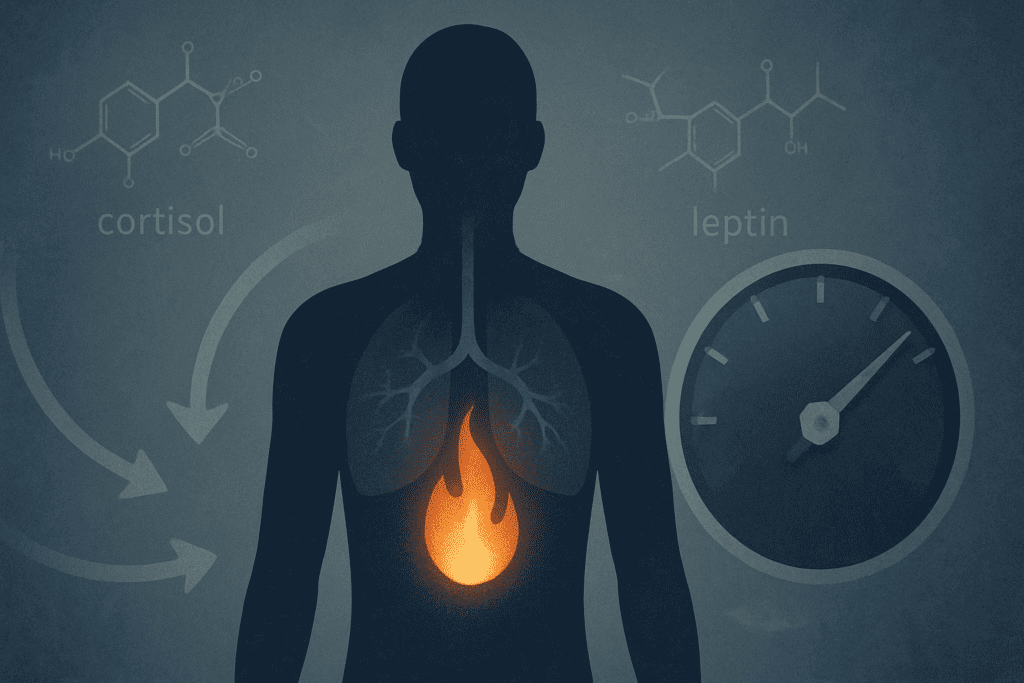
The Metabolic Response to Caloric Restriction: Why Less Isn’t Always More
When caloric intake falls drastically, the body doesn’t simply burn through its fat reserves as many diet plans suggest. Instead, it triggers a metabolic slowdown—a survival strategy that dates back to our ancestors, who often experienced unpredictable food availability. The body shifts into a protective state, slowing down energy expenditure to conserve resources. This means that the fewer calories you consume over time, the fewer your body actually needs to maintain basic functions. This is known as adaptive thermogenesis, and it’s one of the primary reasons why people can gain weight even when eating very little.
When someone repeatedly restricts calories, particularly over an extended period, their resting metabolic rate (RMR) can drop significantly. This drop means that even small amounts of food may exceed what the body now uses for fuel, causing any surplus to be stored, often as fat. So while it may feel like you’re eating “barely anything,” your body’s needs may have dropped so low that you’re still in a relative surplus. This helps explain why can not eating cause you to gain weight is not a baseless question but a valid physiological concern.
Additionally, hormonal shifts—particularly in leptin, ghrelin, and cortisol—can disrupt normal hunger signaling and fat storage. Leptin, the hormone that signals fullness, decreases with calorie restriction, while ghrelin, the hunger hormone, increases. Cortisol, often referred to as the stress hormone, tends to rise when the body is under perceived threat, such as during starvation or under-eating. High cortisol levels are known to promote abdominal fat storage and water retention, compounding the problem of eating less and still gaining weight.
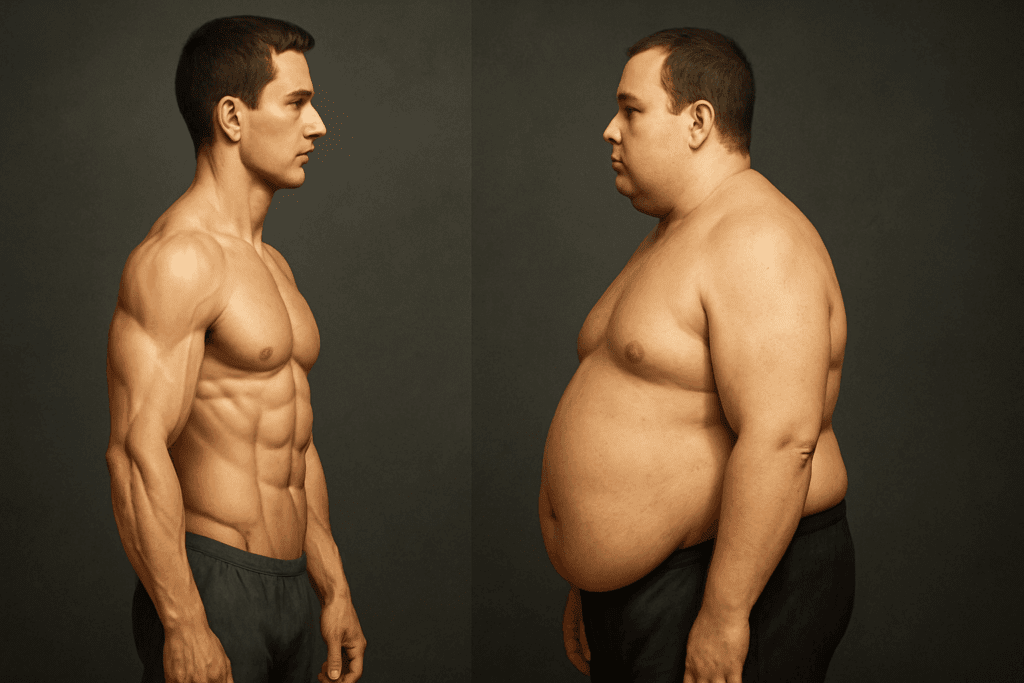
Muscle Loss and Its Impact on Body Composition
Many people assume that any weight gain must be a result of increased fat, but this isn’t always the case. When caloric intake is too low—particularly when protein is insufficient and resistance training is lacking—the body begins to break down muscle for energy. This is a process known as catabolism, and it’s especially pronounced in individuals who under-eat without engaging in strength-building exercise.
Muscle tissue is metabolically active, meaning it burns more calories at rest than fat does. Therefore, losing muscle leads to a reduction in basal metabolic rate. As a result, not only is the body burning fewer calories overall, but it’s also more likely to store excess calories as fat when normal eating resumes. This metabolic adaptation means that can you not eat and gain weight is more than just a counterintuitive idea—it’s a reflection of real physiological consequences that occur when lean mass is compromised.
In this context, someone may appear to be gaining weight while technically consuming very few calories. In reality, the scale is reflecting a shift in body composition—a loss of lean tissue and an increase in fat or water weight. This underscores the importance of evaluating more than just the number on the scale when assessing health and body changes.
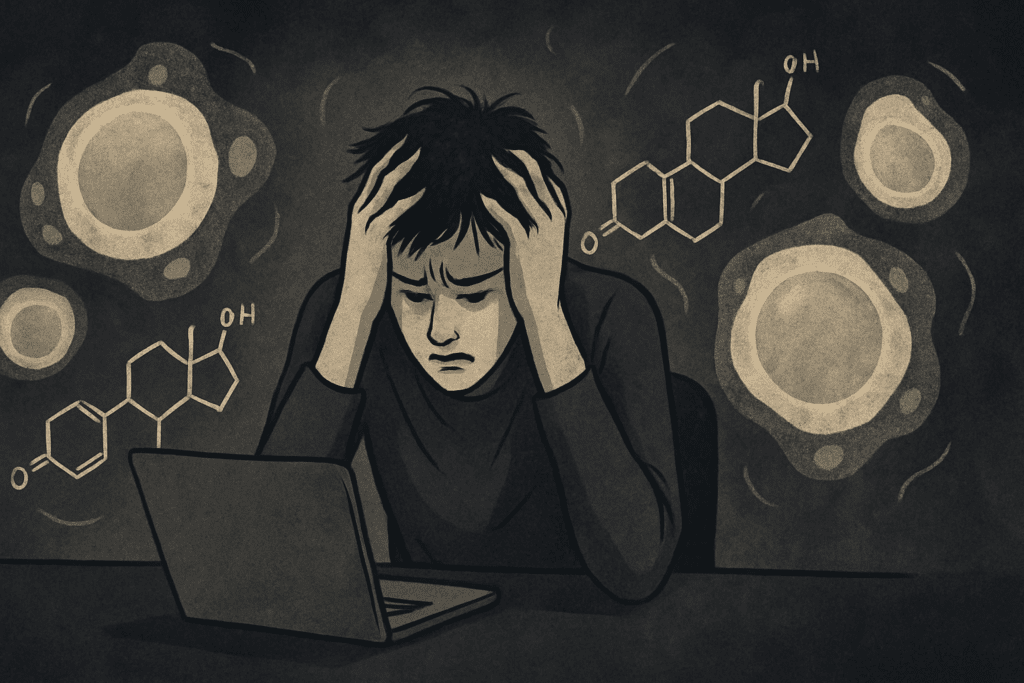
The Role of Chronic Stress and Cortisol in Weight Retention
Chronic stress plays a major role in the body’s ability to maintain a healthy weight. Under-eating is itself a physiological stressor, and when combined with emotional or psychological stress—such as anxiety about body image or restrictive dieting rules—it can significantly elevate cortisol levels. This hormonal change not only affects appetite and cravings, often causing surges in the desire for high-fat, high-sugar foods, but also promotes fat storage, particularly around the midsection.
Cortisol encourages the release of glucose into the bloodstream, preparing the body for “fight or flight.” But when this energy isn’t used due to sedentary behavior or low activity levels, it can be stored as fat. Moreover, cortisol interferes with insulin sensitivity, further exacerbating fat storage and sometimes even leading to insulin resistance over time. This is one reason why some individuals find that not eating can cause you to gain weight, especially when the body is caught in a persistent state of stress.
Furthermore, when the brain perceives a threat, it triggers behavioral changes as well. You may notice a compulsion to binge after periods of restriction or find yourself craving calorie-dense comfort foods at night—behaviors that may not seem significant but that can cumulatively lead to weight gain over time. These responses, rooted in the body’s evolutionary biology, make it extremely difficult to lose weight through under-eating alone.
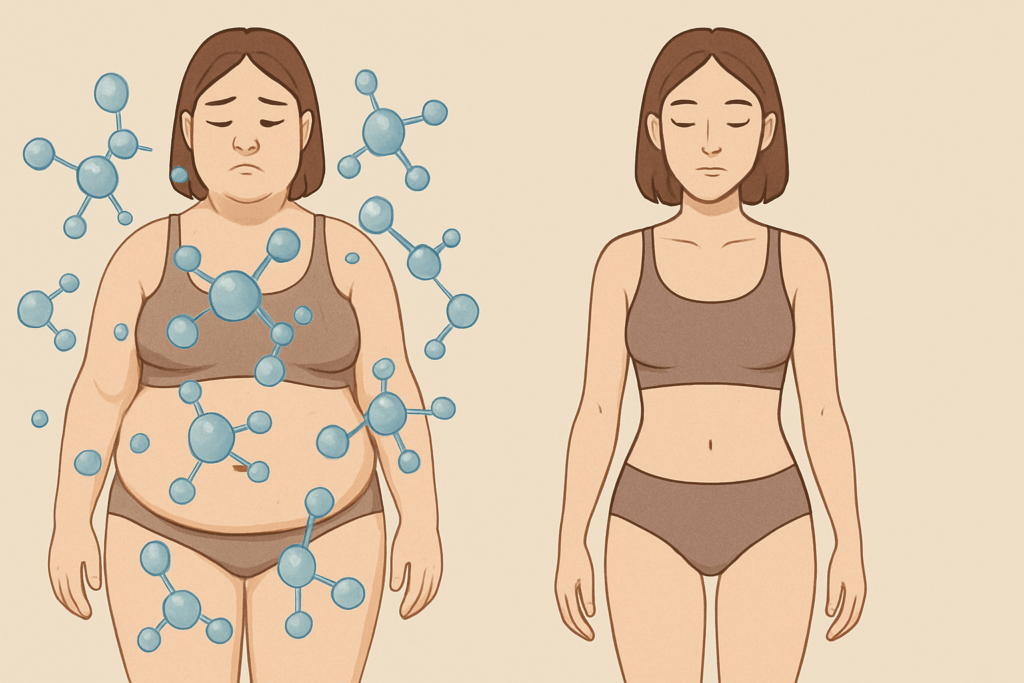
Water Retention and Weight Fluctuations
Another contributor to unexplained weight gain during periods of under-eating is water retention. When the body doesn’t receive adequate calories or nutrients, it can go into conservation mode, holding on to water in an attempt to preserve vital functions. Sodium balance, inflammation, and hormone levels all influence how much water the body retains, which can lead to temporary—but noticeable—increases in weight.
A common complaint among those consuming very few calories is bloating or puffiness, particularly in the face, abdomen, and legs. This isn’t always fat gain, but rather a sign that the body is experiencing stress and imbalance. For example, high cortisol can lead to sodium retention, which pulls water into tissues. Low carbohydrate intake, common among crash diets, depletes glycogen stores, and when glycogen levels are restored even slightly, water binds to the glycogen molecules, leading to a quick jump in scale weight.
These shifts can feel demoralizing, especially for those who believe they are doing everything “right.” But when someone wonders can you put on weight by not eating, they may actually be seeing water retention, inflammation, or even swelling caused by electrolyte imbalances—not necessarily fat accumulation. Still, these fluctuations can have a psychological impact and can influence long-term eating behaviors, particularly if they’re not well understood.
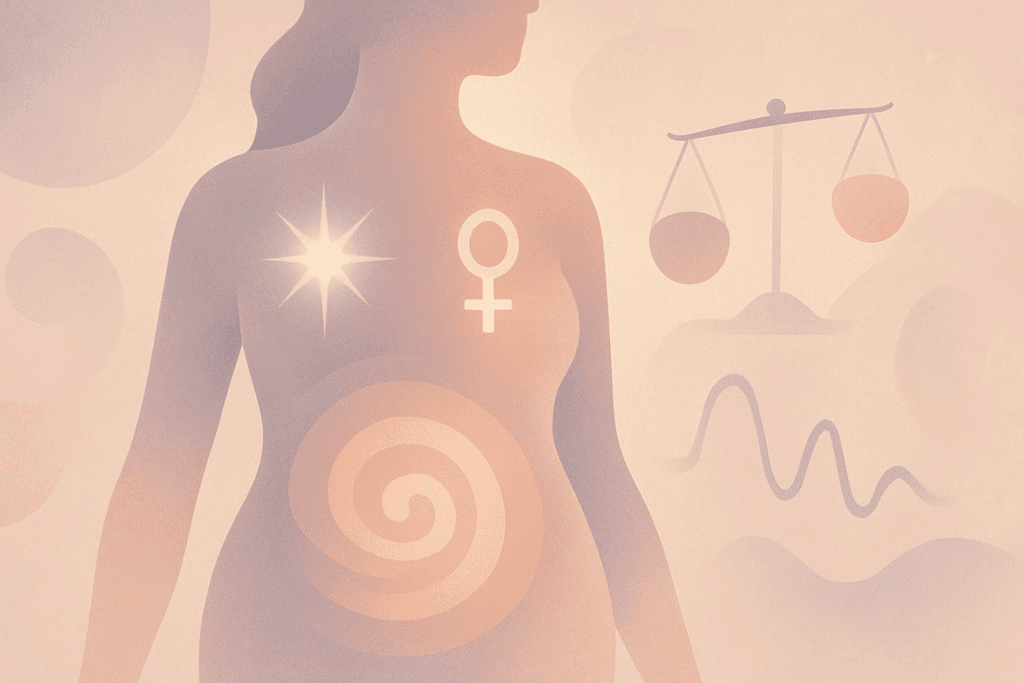
Hormonal Imbalances and the Female Body
For women in particular, the intersection of restrictive eating and hormonal imbalance is especially complex. The female reproductive system is highly sensitive to energy availability, and prolonged caloric restriction can suppress reproductive hormones like estrogen and progesterone. This disruption can result in irregular menstrual cycles, fatigue, and an increased tendency to gain fat, particularly in the abdominal area.
Estrogen plays a role in regulating fat distribution and metabolic rate, and when levels drop due to low energy intake, the body can become more prone to storing fat. Additionally, hormonal shifts can influence how the body uses insulin, how it stores carbohydrates, and how it responds to physical activity. For some women, the paradox becomes clear: why am I gaining weight when I barely eat—because the body is functioning under stress and prioritizing survival over reproduction and other energy-expensive systems.
In cases of amenorrhea (loss of menstrual period due to under-eating or overexercising), restoring proper nutrition and body fat percentage is often necessary to regain hormonal balance. During this period of refeeding, the body may gain weight quickly, further confusing those who already feel betrayed by their efforts. However, this weight gain is often necessary for restoring full metabolic and reproductive health.
The Psychological Cycle of Restriction and Rebound
The cycle of restricting food, experiencing weight gain or plateau, and then restricting further is not only physically damaging—it’s emotionally exhausting. For many people, this cycle can last for years and lead to disordered eating patterns that erode self-trust. It’s not uncommon to see individuals searching phrases like “will not eating make you gain weight” as they attempt to make sense of a situation that feels both unfair and out of control.
Psychologically, restriction creates an environment of scarcity that makes food more appealing, increasing the likelihood of future overeating. This rebound effect isn’t a failure of willpower but a biological imperative. The human brain is hardwired to seek food when energy is scarce, and when finally allowed to eat freely, the pendulum often swings toward bingeing. The emotional distress that follows—often accompanied by guilt, shame, and renewed restriction—can perpetuate weight gain over time.
Breaking this cycle requires not just a change in eating habits, but a re-education in body trust, hunger cues, and nutritional adequacy. Many people regain their health and metabolic flexibility only when they learn to eat enough—not less. This is why the concept behind can not eating make you gain weight must be addressed not just through science, but through compassion and mental health support.

Refeeding, Recovery, and Weight Normalization
One of the most misunderstood stages of metabolic recovery is refeeding. After prolonged periods of under-eating, increasing caloric intake often leads to temporary weight gain. This is normal, expected, and even necessary for restoring metabolic health. But it can be emotionally difficult for those who have spent months or years suppressing their appetite and body weight.
Refeeding allows the body to resume functions that were suppressed during restriction—like proper hormone production, body temperature regulation, and digestion. It also helps rebuild lost muscle mass, improve insulin sensitivity, and restore electrolyte balance. During this time, it’s common to see fluctuations in weight, hunger levels, and energy, which can lead people to question again: can you not eat and gain weight? Yes—but it’s important to understand why and to interpret these changes within the context of healing.
The key to long-term health is metabolic resilience—your body’s ability to respond to stress, eat intuitively, and maintain a stable weight over time without extremes. This is not achieved through chronic restriction, but through sustainable nutrition, movement, and lifestyle practices that support the body’s innate intelligence.
Understanding Your Body’s Signals Without Shame
Perhaps the most empowering shift someone can make in their health journey is to reframe weight gain not as a moral failing, but as a communication tool. When someone wonders can not eating cause you to gain weight, they are often observing real signals from their body that something is out of balance. The body isn’t “broken”—it’s adaptive. It responds to starvation by protecting itself. It stores energy when it fears famine. It slows down when it’s underfed.
Rather than fighting these signals, the goal should be to understand them. True health comes from alignment between your body’s needs and your behaviors—not from punishing it into submission. If you are gaining weight despite eating very little, it is not because your body is defying logic. It’s because the logic we’ve been taught around food, weight, and worth is incomplete and often deeply flawed.
Healing from chronic under-eating and the psychological burden that comes with it requires education, patience, and sometimes professional support. But with the right approach, it’s possible to rebuild a healthy relationship with food and reclaim your body’s natural rhythm.
Frequently Asked Questions: Why Am I Gaining Weight When I Barely Eat?
1. Can not eating make you gain weight even if you’re consuming fewer than 1,200 calories a day?
Yes, under certain conditions, eating too few calories—such as fewer than 1,200 per day—can paradoxically contribute to weight gain. When calorie intake drops too low, the body enters a state of metabolic adaptation, drastically slowing down energy expenditure to conserve fuel. Over time, this can cause the metabolism to become less responsive to even small meals. In this survival mode, fat storage becomes a priority while muscle tissue may be broken down, reducing metabolic efficiency even further. So, while it might seem counterintuitive, can not eating make you gain weight is a legitimate concern rooted in how the body responds to prolonged energy deprivation.
2. Why am I gaining weight when I barely eat but still drink coffee or energy drinks during the day?
Many people overlook the metabolic effects of beverages consumed throughout the day, particularly caffeinated ones. When you’re eating less but consuming energy drinks or high-caffeine coffee on an empty stomach, your cortisol levels can spike, which encourages fat storage and muscle breakdown. Cortisol-driven stress responses are known contributors to metabolic slowdown, especially when paired with caloric restriction. This dynamic partially answers why am I gaining weight when I barely eat—because stress and nutritional imbalance trigger mechanisms that lead to fat retention. Moreover, sweetened coffee beverages can sneak in unexpected calories that push the body into a subtle energy surplus despite low food intake.
3. Can you not eat and gain weight due to sleep deprivation or poor circadian rhythms?
Absolutely. The body’s internal clock—its circadian rhythm—plays a crucial role in metabolism, hormone release, and energy balance. When sleep is irregular or insufficient, levels of leptin and ghrelin become disrupted, making hunger signals erratic and promoting fat retention. Even if you’re eating very little, poor sleep increases cortisol and insulin resistance, which are both linked to weight gain. For those who wonder can you not eat and gain weight, the answer can lie in the hidden metabolic consequences of disrupted sleep. Addressing lifestyle factors beyond food intake is essential for sustainable weight management.
4. How can eating less and still gaining weight be related to gut health?
Gut health has emerged as a significant factor in weight regulation, regardless of calorie intake. An imbalanced gut microbiome can impair digestion, influence fat storage, and alter the absorption of nutrients. Certain bacterial strains associated with dysbiosis can make the body more prone to storing fat even when calories are low. This may explain why eating less and still gaining weight is a common frustration among people with gastrointestinal issues. Supporting gut health through fiber-rich foods, probiotics, and stress reduction can help restore metabolic flexibility—even if your diet remains low in calories.
5. Can you put on weight by not eating if you’ve been dieting for years?
Yes, long-term dieting can have cumulative effects on metabolic rate, hormonal balance, and body composition. Chronic restriction teaches the body to become “efficient” at holding onto energy, especially fat, as a survival tactic. Over time, this can lead to a phenomenon known as metabolic adaptation or “starvation mode,” where the body resists weight loss efforts and may even gain weight on minimal intake. People often report that after years of dieting, they now can put on weight by not eating, which is often the result of diminished muscle mass and hormonal suppression. In these cases, restoring a more balanced eating approach is usually necessary to reverse the effects.
6. What role does muscle loss play in why I’m gaining weight when I barely eat?
Muscle tissue is metabolically active and burns calories at rest, so when it’s lost through under-eating, your daily energy expenditure drops significantly. Without resistance training or adequate protein, the body will catabolize muscle to preserve essential functions. As a result, even small meals may exceed your body’s new, lower energy needs, leading to fat gain. This explains one reason why am I gaining weight when I barely eat—because your muscle mass may have declined, altering your body’s caloric needs. To counter this, including strength training and ensuring protein adequacy is essential, even when weight loss is the goal.
7. Can emotional restriction have the same effects as physical under-eating on body weight?
Surprisingly, yes. Even if someone eats a reasonable number of calories, but feels constant guilt, anxiety, or shame around food, the body can interpret this psychological stress similarly to physical deprivation. Elevated cortisol from emotional restriction can lead to fat retention, blood sugar instability, and inflammation. These changes reinforce the paradox where can not eating cause you to gain weight has emotional and physiological layers. Emotional well-being plays a direct role in metabolism, and healing your relationship with food can be just as important as nutritional adequacy.
8. Is it true that you can not eat and gain weight if you’re on certain medications?
Yes, several medications—especially antidepressants, antipsychotics, corticosteroids, and some hormonal treatments—can alter weight regulation. These medications may interfere with appetite cues, insulin sensitivity, or fat distribution, sometimes making it appear that you can not eat and gain weight. In such cases, weight gain is not due to food intake but to medication-induced metabolic changes. If you’re experiencing unexplained weight changes while taking a prescribed drug, speak with a healthcare provider. Never discontinue a medication on your own, but explore alternatives or supportive strategies to mitigate side effects.
9. Can will not eating make you gain weight long-term even if you lose weight initially?
This is a critical insight: many people do lose weight in the short term when they begin restrictive diets, but long-term data shows that most regain the weight—and often more—within a few years. This “yo-yo effect” is rooted in metabolic compensation, where the body lowers its calorie needs during restriction and aggressively stores fat during refeeding. Over time, this pattern can actually lead to higher body fat percentages and a slower metabolism. That’s why will not eating make you gain weight is not just a theoretical question—it’s a long-term reality for many who rely on unsustainable methods. Sustainable weight management requires consistency, not chronic restriction.
10. What can I do if I’m eating less and still gaining weight despite following all the “rules”?
First, it’s important to reframe what the “rules” are. Popular diet culture often promotes over-simplified approaches that fail to consider individual variation, stress, sleep, hormones, and muscle mass. If you’re eating less and still gaining weight, it may be time to evaluate not only what you’re eating, but how you’re living. Are you sleeping enough? Are you managing stress? Do you engage in movement that builds strength? Ask yourself whether your current routine supports whole-body health—not just calorie control. Working with a registered dietitian or integrative practitioner can help identify hidden metabolic or hormonal imbalances that may be contributing to your frustration.
Conclusion: Why Gaining Weight When You Barely Eat Is a Sign to Nourish, Not Punish
If you’ve found yourself asking, “Why am I gaining weight when I barely eat?” or researching whether not eating can cause you to gain weight, know that you are not alone—and your question is valid. Many people face this metabolic paradox, especially after long-term calorie restriction or chronic stress. The truth is, the body is not a simple equation of calories in versus calories out. It is an adaptive, intelligent system that responds to deprivation by preserving energy, altering hormones, and conserving fat stores.
So yes, will not eating make you gain weight? Under the right conditions, it absolutely can—particularly when the body’s metabolism has slowed, cortisol is elevated, muscle mass has decreased, and nutrient deficiency has taken hold. Rather than reacting with more restriction, the solution lies in nourishment, balance, and consistency.
Gaining weight while eating less is not an indictment of your willpower—it’s a sign that your body is doing exactly what it’s designed to do in times of stress and scarcity. The key to reversing the cycle is not to eat even less, but to restore trust in your body by feeding it well, moving it with care, and giving it the tools it needs to thrive.
Further Reading:
Why Am I Gaining Weight When I Barely Eat?
9 Reasons You May Be Gaining Weight Unintentionally
8 reasons you’re experiencing weight gain on a restricted diet


